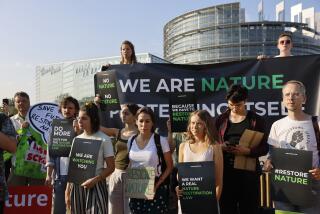Macedonia Leader Urges Support for Peace Accord
- Share via
SKOPJE, Macedonia — President Boris Trajkovski pleaded Friday for lawmakers to support a NATO-backed peace deal granting greater rights to Macedonia’s ethnic Albanian minority. The country’s largest party formally endorsed the plan, indicating that the votes should be there to approve it.
The agreement “is not perfect, but the alternative is the disintegration of Macedonia at all levels: civil, political, by ethnic group, by age,” Trajkovski told parliamentarians in a speech that was delayed by about 500 protesters who blocked building entrances for half the day.
“The alternative to peace is war, which will result in heavy casualties, mass poverty and destruction of our future. . . . I ask all political leaders to play their roles responsibly, and from citizens I ask support and understanding to try together to pull Macedonia from the abyss.”
Trajkovski also outlined the benefits that Macedonia expects from the West as a result of cooperating in the peace plan, including economic aid and long-desired international recognition of the country by the name it calls itself, the Republic of Macedonia. At the insistence of Greece, which has a northern province named Macedonia, this country is referred to in the United Nations as “the Former Yugoslav Republic of Macedonia.” Many here find the designation degrading; they say it questions the country’s nationhood and self-identity.
If implemented by parliament, the accord would raise the legal status of the Albanian language and add many more ethnic Albanians to the police force.
Leaders of the four political parties in the government--two ethnic Macedonian and two ethnic Albanian--signed the peace agreement Aug. 13, triggering a pledge by ethnic Albanian guerrillas to hand over their weapons to the North Atlantic Treaty Organization.
In what the Western alliance has dubbed Operation Essential Harvest, NATO has sent 4,300 soldiers to Macedonia in a 30-day effort to collect arms. NATO expects to receive about 3,300 weapons.
The guerrillas, who launched their insurgency in February, say they were fighting for equal rights, while the government has charged that they want to split Macedonia. At least 25% of the country’s 2 million population is ethnic Albanian.
Should the guerrillas continue fighting despite enactment of political reforms, then “we expect the U.N. Security Council to threaten or use force against this source of instability and terror in the Balkans,” Trajkovski said.
“We will try to re-integrate the ones who were engaged in the fighting and who disarm voluntarily,” he said.
Outside parliament, protesters who see the peace deal as caving in to pressure from terrorists waved banners reading “U.S. and NATO leave Macedonia in 48 hours” and “We demand the resignation of the entire government.”
The demonstrators--including many who fled or were forced out of rebel-held areas--scuffled with some lawmakers, including an ethnic Albanian legislator, Zehir Bekteshi, who fled attackers after being punched and kicked.
“You are traitors to the country!” some screamed at riot police who eventually took control of the building’s entrances.
It has not been certain that the required two-thirds of the 120 members of parliament would endorse the political reforms. On Friday, the executive committee of VMRO, the larger and more hard-line of the two ethnic Macedonian parties that signed the deal, decided that its lawmakers should back the plan, state TV reported.
VMRO spokesman Georgi Trendafilov said his party’s 47 legislators would vote in favor of moving the plan forward, though it appeared likely that there would be a few defectors. A vote to launch a constitutional reform process to implement the plan is expected next week.
Branko Crvenkovski, head of the Social Democratic Alliance, declared Friday that all members of parliament from his party would also back the reforms. With 24 seats held by ethnic Albanian lawmakers, who all support the deal, it appeared that nothing would threaten the plan in next week’s vote, short of a large-scale rebellion by ethnic Macedonian lawmakers.
More to Read
Sign up for Essential California
The most important California stories and recommendations in your inbox every morning.
You may occasionally receive promotional content from the Los Angeles Times.













